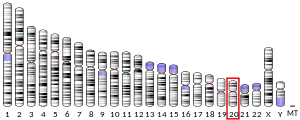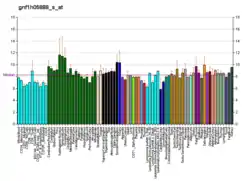NAPB
Beta-soluble NSF attachment protein is a SNAP protein involved in vesicular trafficking and exocytosis which is encoded by the NAPB gene humans is.[5][6]
| NAPB | |||||||||||||||||||||||||||||||||||||||||||||||||||
|---|---|---|---|---|---|---|---|---|---|---|---|---|---|---|---|---|---|---|---|---|---|---|---|---|---|---|---|---|---|---|---|---|---|---|---|---|---|---|---|---|---|---|---|---|---|---|---|---|---|---|---|
| Identifiers | |||||||||||||||||||||||||||||||||||||||||||||||||||
| Aliases | NAPB, SNAP-BETA, SNSF attachment protein beta | ||||||||||||||||||||||||||||||||||||||||||||||||||
| External IDs | OMIM: 611270 MGI: 104562 HomoloGene: 5332 GeneCards: NAPB | ||||||||||||||||||||||||||||||||||||||||||||||||||
| |||||||||||||||||||||||||||||||||||||||||||||||||||
| |||||||||||||||||||||||||||||||||||||||||||||||||||
| |||||||||||||||||||||||||||||||||||||||||||||||||||
| |||||||||||||||||||||||||||||||||||||||||||||||||||
| |||||||||||||||||||||||||||||||||||||||||||||||||||
| Wikidata | |||||||||||||||||||||||||||||||||||||||||||||||||||
| |||||||||||||||||||||||||||||||||||||||||||||||||||
References
- GRCh38: Ensembl release 89: ENSG00000125814 - Ensembl, May 2017
- GRCm38: Ensembl release 89: ENSMUSG00000027438 - Ensembl, May 2017
- "Human PubMed Reference:". National Center for Biotechnology Information, U.S. National Library of Medicine.
- "Mouse PubMed Reference:". National Center for Biotechnology Information, U.S. National Library of Medicine.
- Whiteheart SW, Griff IC, Brunner M, Clary DO, Mayer T, Buhrow SA, Rothman JE (Apr 1993). "SNAP family of NSF attachment proteins includes a brain-specific isoform". Nature. 362 (6418): 353–5. Bibcode:1993Natur.362..353W. doi:10.1038/362353a0. PMID 8455721. S2CID 4341471.
- "Entrez Gene: NAPB N-ethylmaleimide-sensitive factor attachment protein, beta".
Further reading
- Gerhard DS, Wagner L, Feingold EA, et al. (2004). "The status, quality, and expansion of the NIH full-length cDNA project: the Mammalian Gene Collection (MGC)". Genome Res. 14 (10B): 2121–7. doi:10.1101/gr.2596504. PMC 528928. PMID 15489334.
- Ota T, Suzuki Y, Nishikawa T, et al. (2004). "Complete sequencing and characterization of 21,243 full-length human cDNAs". Nat. Genet. 36 (1): 40–5. doi:10.1038/ng1285. PMID 14702039.
- Strausberg RL, Feingold EA, Grouse LH, et al. (2003). "Generation and initial analysis of more than 15,000 full-length human and mouse cDNA sequences". Proc. Natl. Acad. Sci. U.S.A. 99 (26): 16899–903. Bibcode:2002PNAS...9916899M. doi:10.1073/pnas.242603899. PMC 139241. PMID 12477932.
- Deloukas P, Matthews LH, Ashurst J, et al. (2002). "The DNA sequence and comparative analysis of human chromosome 20". Nature. 414 (6866): 865–71. Bibcode:2001Natur.414..865D. doi:10.1038/414865a. PMID 11780052.
- Prekeris R, Klumperman J, Chen YA, Scheller RH (1998). "Syntaxin 13 mediates cycling of plasma membrane proteins via tubulovesicular recycling endosomes". J. Cell Biol. 143 (4): 957–71. doi:10.1083/jcb.143.4.957. PMC 2132958. PMID 9817754.
- Osten P, Srivastava S, Inman GJ, et al. (1998). "The AMPA receptor GluR2 C terminus can mediate a reversible, ATP-dependent interaction with NSF and alpha- and beta-SNAPs". Neuron. 21 (1): 99–110. doi:10.1016/S0896-6273(00)80518-8. PMID 9697855. S2CID 18569829.
- Wilson DW, Whiteheart SW, Wiedmann M, et al. (1992). "A multisubunit particle implicated in membrane fusion". J. Cell Biol. 117 (3): 531–8. doi:10.1083/jcb.117.3.531. PMC 2289450. PMID 1315316.
This article is issued from Wikipedia. The text is licensed under Creative Commons - Attribution - Sharealike. Additional terms may apply for the media files.




